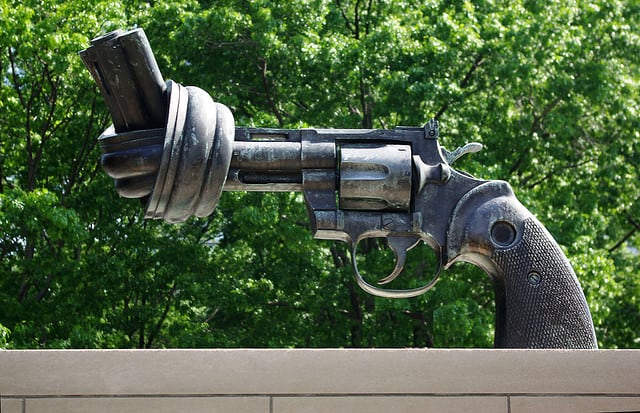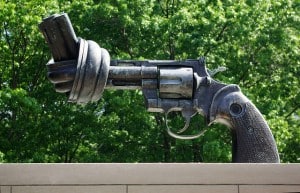We live in a country where at least 14 people were killed over the 4th of July weekend in Chicago and where mass shootings seem to have become normal. We live in a world with old and new conflicts creating more and more violence: Israel and Palestine, Syria, Iraq, Sudan, Ukraine…etc. What is our reaction when we see this violence? What a shame. They need our prayers. Why is all this happening, God?!?
I have always been moved by people who are able to respond artistically. Bob Dylan sang of Ruben “Hurricane” Carter who was set-up by police for murder. Bruce Springsteen sang of Amadu Diallo who was shot 41 times by police. School children in Chicago at the Daley Academy used drawing as a means of expressing their own reaction. Reactions can vary from protests, peace vigils, or poetry.
The Alternate Routes, with two members who are graduates of Fairfield University, released a song last year to raise awareness for Newton Kindness, a charity that was formed to honor one of the victims of the Sandy Hook tragedy, Charlotte Bacon. Their mission is to foster compassion in children. One of the repeated lines of the Alternate Routes song goes:
“we are how we treat each other, nothing more”.
It is a good reminder of something we have heard time and time again, we are all in this together. When we turn away from the violence in different parts of our own cities, states, or countries, aren’t we really just telling the people that live there we don’t care? This might seem to be the only sane coping mechanism — to turn away and to not be overwhelmed. Safe, maybe. But, if we turn away from the violence, do we miss the opportunity to grow closer to each other, closer even to God?
The late Jesuit priest Dean Brackley, remarked in his book The Call to Discernment in Troubled Times that
“These turbulent times disclose our needs for a discipline of the spirit. To respond to our world we must get free to love. That involves personal transformation, which includes coming to terms with evil in the world and in ourselves, accepting forgiveness, and changing.”
But how do we “come to terms”? How do we engage with these troubled times? Well I think it starts by not turning away. Rather, turn towards. It can be something as simple as when reading articles about the violence, to go over them slowly, prayerfully. If a name is mentioned, either victim or perpetrator, pray for that person by name. Use your talents to express your reactions, maybe it is writing a poem that no one will ever see. The reaction we have to violence is personal and the more we examine it and pray with it, the more we will let it transform us.



